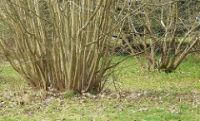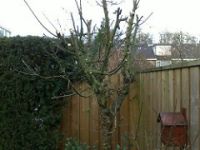Growing Firewood in Your Garden

 Coppicing is an ancient way of managing trees that involves cutting down growth after a period of years, after which new growth will appear, also to be cut in its turn. The period between planting and harvesting depends on which variety or varieties of tree you have chosen. Each tree has a different length coppicing cycle. Some good examples for most gardens will be swift growing trees like willow, hazel, hawthorn, and ash, though there are plenty of other trees that can be used for longer term coppicing plans.
Coppicing is an ancient way of managing trees that involves cutting down growth after a period of years, after which new growth will appear, also to be cut in its turn. The period between planting and harvesting depends on which variety or varieties of tree you have chosen. Each tree has a different length coppicing cycle. Some good examples for most gardens will be swift growing trees like willow, hazel, hawthorn, and ash, though there are plenty of other trees that can be used for longer term coppicing plans.
 Yes, coppicing takes patience. It will often be a few years before you will be able to harvest saplings that you planted and then you will coppice on a cycle of, for example, seven years or so, for hazel. But in reward for your efforts, you will get a stand, with multiple trunks, that is not only attractive but also good for the wildlife in your garden or on your land.
Yes, coppicing takes patience. It will often be a few years before you will be able to harvest saplings that you planted and then you will coppice on a cycle of, for example, seven years or so, for hazel. But in reward for your efforts, you will get a stand, with multiple trunks, that is not only attractive but also good for the wildlife in your garden or on your land.
Though one or two coppiced trees will only, obviously, provide a small amount of firewood to season, or a small amount of wood for other purposes, it is interesting to learn more about how woodland has been managed over hundreds of years – albeit on a much smaller scale. This is just one of the ways than a conscientious organic gardener can cater to their own needs while still making sure that the natural ecosystem is healthy and the process is sustainable.
 As well as coppicing, you can also use some of the wood cut in pruning from, for example, a mature apple tree. Apple trees can be considered a source of a little firewood each year in winter as well as a source of food. Apple wood smells lovely when used in a wood burning stove or on a bonfire. Pear tree prunings also smell very nice when burned. Prunings from several other trees are fantastic for supplementing your firewood.
As well as coppicing, you can also use some of the wood cut in pruning from, for example, a mature apple tree. Apple trees can be considered a source of a little firewood each year in winter as well as a source of food. Apple wood smells lovely when used in a wood burning stove or on a bonfire. Pear tree prunings also smell very nice when burned. Prunings from several other trees are fantastic for supplementing your firewood.
Sustainable gardening is all about making the most of the space you have to provide for at least some of your own needs, while working with nature. Finding firewood supplies your garden is one way to do just that.